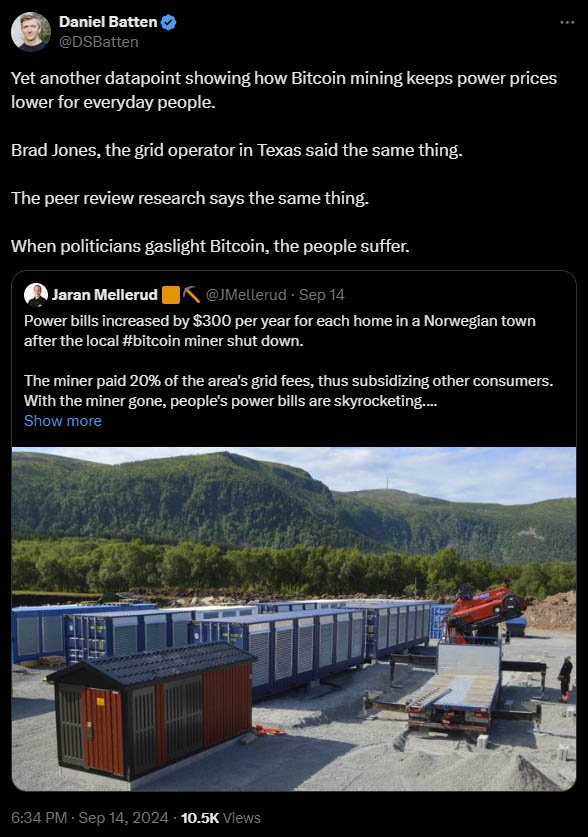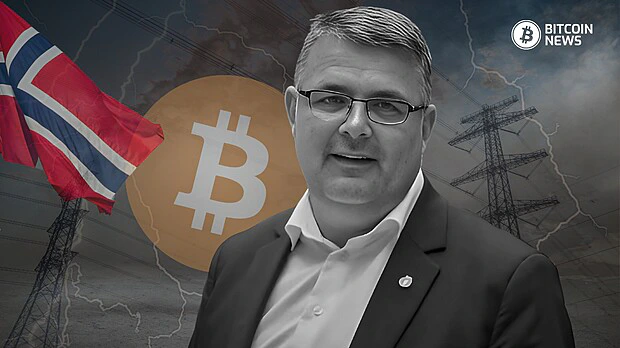Residents of Hadsel, a small Norwegian municipality, are grappling with a sudden 20% increase in their electricity bills following the closure of a major Bitcoin mining center.
The data center, which was responsible for mining Bitcoin, had been one of the region’s largest consumers of electricity, using an estimated 80 gigawatt hours (GWh) annually.
While the closure of the Bitcoin mining facility may seem sudden, reports state that it was shut down following complaints from local residents about the noise generated by the operation.
According to Hadsel’s Mayor, Kjell-Børge Freiberg, residents had been campaigning for the center’s shutdown due to the disturbance it caused to their everyday lives.
Freiberg told local media that many in the community found the noise intolerable, and they are relieved it’s now gone. However, while the community celebrated the quiet after the mining center’s closure, the aftermath has been far from ideal.
The closure of the mining center has had a significant impact on the local economy, leading to a noticeable increase in energy costs for Hadsel residents.
Related: Norway Tightens Grip on Bitcoin Miners by Raising Bar for Data Centers
The Bitcoin data center accounted for around 20% of the income for Noranett, the region’s local electricity provider. With this large customer no longer in operation, the company has been forced to redistribute the costs among the remaining residents, causing electricity bills to skyrocket by 20%.
Noranett network manager Robin Jakobsen explained that the center’s shutdown left a substantial gap in revenue. he said:
“When such a large individual customer switches off overnight, it has an impact.”
For local households, this has translated into an annual increase in energy expenses. On average, families in Hadsel are now paying an additional $2,500 to $3,000 per year for electricity, according to reports.
This sharp rise is causing concern for many residents, who had hoped the center’s closure would improve their quality of life but were unprepared for the economic fallout.
In addition to providing revenue for the local power company, the center had a ripple effect on other businesses in the area, as many jobs and services were tied to its operation.
According to estimates, the center’s electricity usage was equivalent to that of 3,200 households. The redistribution of these energy costs is now being borne by residents, who are feeling the pinch.
Mayor Freiberg highlighted the limited ability of local officials to mitigate the financial impact, explaining:
“This is how the regulation of our power system works, which lies outside the municipality’s authority and control. We have to deal with that.”
In response to the current situation, local authorities are actively working to attract new businesses to replace the lost revenue.
Mayor Freiberg expressed optimism, noting that they are seeking other energy-intensive industries, such as data centers or manufacturing plants, that could utilize the power previously allocated to the Bitcoin mining center.
He mentioned that the current challenge is temporary and they are focused on bringing in major energy consumers to help stabilize electricity prices for local residents.
The situation in Hadsel underscores the complex relationship between Bitcoin mining operations and local economies.
On one hand, these centers provide significant revenue for local utility companies and help keep energy costs low for the general population. On the other hand, their presence can cause challenges, such as noise disturbances, as was the case in Hadsel.
Related: Bitcoin Mining, Clean Energy and Grid Balance | ERCOT Study
Climate tech and Bitcoin supporter Daniel Batten commented on the situation, explaining that it demonstrates how Bitcoin mining can benefit local economies by helping to reduce power prices when managed effectively.
However, when these centers shut down, the loss of such a major energy consumer can have significant economic repercussions.

He highlighted that this is another example of how Bitcoin mining helps keep power prices lower for everyday people.
Kjetil Hove Pettersen, the CEO of local firm KryptoVault, suggested that this might be yet another instance of the media distorting the narrative around Bitcoin, stating, “It is usually the negative voices that get the most media attention; this does not reflect on all local opinions.”
Hadsel’s story is not unique. Across the world, communities are grappling with the pros and cons of hosting Bitcoin mining centers.
The energy consumption required to mine Bitcoin is substantial, leading to debates about environmental sustainability, the strain on local energy grids, and the potential economic benefits these operations bring to small towns.
Despite the negative narrative, there have been numerous studies proving that Bitcoin mining has unparalleled benefits for power grids. The instant switching of power load—a feature that other electricity consumers lack—makes Bitcoin mining an ideal industry for balancing power grids.
In Hadsel, the situation is a stark reminder of how deeply intertwined Bitcoin mining and local communities can become. While residents are relieved to be free from the noise, they now face a new challenge: adjusting to the higher cost of living caused by the mine’s closure.
As Hadsel moves forward, the town is focusing on finding new ways to use the energy once consumed by the Bitcoin mining center. But this can be challenging, as no other industry possesses the flexibility that Bitcoin mining offers in electricity consumption.
Nevertheless, the mayor and local officials remain optimistic that new projects will come to the area, restoring financial stability and helping to lower electricity prices once again. It remains to be seen how this plan would work out.
For now, though, the community must navigate the current economic hurdles while adjusting to life without the Bitcoin mining center.
The challenge for Hadsel—and other towns like it—will be balancing the benefits of technological advancements with the long-term needs of its residents.










